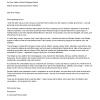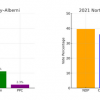Dear Party Leader,
On February 5th 2015, the parliamentary Political & Constitutional Reform Committee (PCRC) published its report into ‘voter engagement’ in which it recommended a number of electoral reforms that it would like to see implemented during the next parliament.
In this report, the PCRC felt compelled to explicitly recommend that the next government consult before May 2016 specifically on the issue of inclusion of a formal ‘None of the Above’ (NOTA) option on UK ballot papers for all future national elections. This was as a result of successful lobbying from my organisation NOTA UK and 71.8% of nearly 16,000 responses to a survey question in favour of NOTA.
The PCRC's cited reasons were a clear increase in public demand for NOTA and the potential positive impact on voter engagement that its inclusion could have. Here is an extract from the section on NOTA from the PCRC's report:
“Having the option to vote for “none of the above” on the ballot paper is the proposal which has had the largest support among those who have given their views to the surveys we have drawn upon. This change would enable people to participate at elections even if they did not wish to vote for any of the candidates presented. If large numbers of people did choose to cast their vote in this way it would serve as a wakeup call for candidates and parties that they needed to do more to gain the support of the electorate. We recommend that the Government consult on including, on ballot papers for national elections, an option for voters who wish to participate but not vote for any of the candidates presented, and report to the House on this proposal by May 2016.”
In light of this, and with an election coming up that could see your party holding the balance of power, we would very much like to know where you stand on the issue of NOTA and whether or not you intend to honour the PCRC's recommendation to consult on its inclusion if you find yourself in government after May 7th.
Before replying, please be sure that your response takes into account the following facts:
1: NOTA is a democratic pre-requisite, representing as it does the all important ability to formally withhold consent at an election (consent being central to the concept of democracy but only truly measurable if it is possible to withhold consent). In the context of elections, this withholding of consent must be formal as the giving of consent (voting) is formal. Yet it is not currently possible to do this in the UK. Neither abstaining or ballot spoiling equates to formally withholding consent as both acts can be misconstrued and neither in any way affects the result no matter how many people do it. The only way to facilitate the withholding of consent formally at an election, something that is essential in any true democracy, is via an official NOTA option on the ballot paper with formalised consequences for the result if the majority choose it.
This means that the inclusion of NOTA on ballot papers cannot be argued against without arguing against the concept of democracy itself, once the ideas of democracy, consent and NOTA are properly understood.
2: The current position of the Electoral Commission (EC) on NOTA is untenable, as it appears to have not changed in light of the PCRC's recommendation. In their view:
“…the purpose of an election is to elect one of the nominated candidates to elected office. An election is about making a choice between the nominated candidates and expressly allowing for ‘positive abstention’ defeats that purpose and discourages voters from engaging with the candidates on offer.” - From the EC's ‘Standing for Election in the UK’ report ( http://www.electoralcommission.org.uk/__data/assets/pdf_file/0008/180458... )
However, this view does not stand up to scrutiny for a number of reasons.
Firstly, the purpose of an election in a true democracy is not solely to elect one of the nominated candidates to office. It is to facilitate accurate representation in government of the will of the electorate. If no candidate or party on offer fits that bill in the eyes of voters, then they should be able to formally reject all that is on offer. If the majority choose to do so, then a formal rejection will have taken place that will then have to be officially acknowledged and acted upon. This is democracy in action.
Secondly, it is incorrect to define NOTA as ‘positive abstention’. Abstention equates to non-participation. You abstain at a general election by either not registering to vote at all or by registering but not attending the polling station to vote. By contrast, voting NOTA equates to active participation because, unlike abstaining, withholding consent and rejecting all candidates via a formal NOTA option (if implemented properly i.e.: with formalised consequences for the result if NOTA were to ‘win’) could always potentially impact on the result.
By conflating NOTA with the idea of abstention, albeit supposed ‘positive abstention’, the EC is in fact conflating it with the idea of non-participation. This is disingenuous and not a position that we expect them to be able to hold for much longer, especially in light of the PCRC's recommendation and the growing realisation among the general public that NOTA is in fact a democratic pre-requisite.
With all that in mind, I very much look forward to receiving your response and having the opportunity to gauge how much your party is committed to promoting true democracy in the UK.
Yours sincerely,
Jamie Stanley
NOTA UK
M: 07858 461 002
E: [email protected]
W: www.nota-uk.org
















